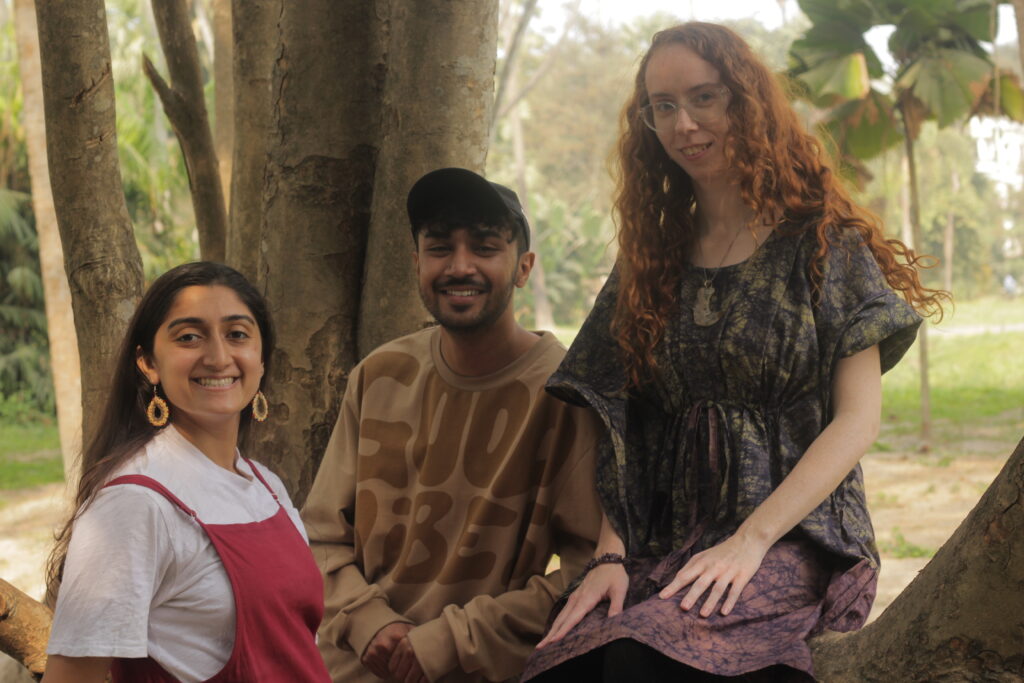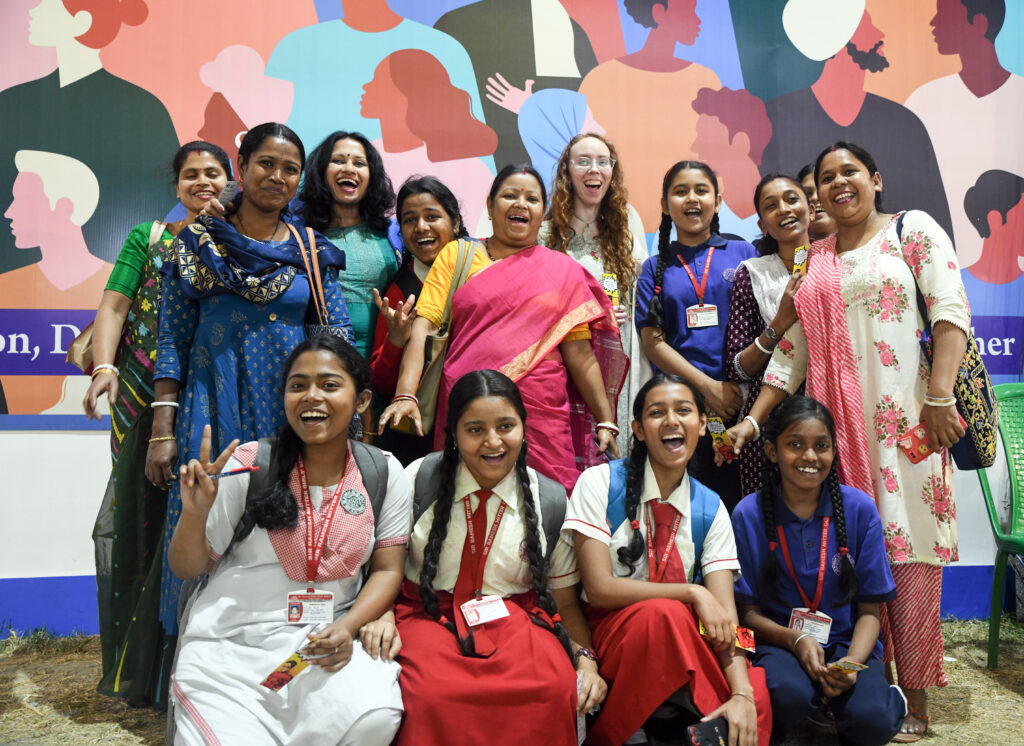
By Anesce Dremen
Although I have just completed a Fulbright-Nehru English Teaching Assistantship in Kolkata, India – I originally abstained from applying because I felt unworthy and that I just wasn’t ready yet. This is not a unique mindset for many first generation, low income (FGLI) college students or graduates. In my interactions with other FGLI students/graduates, I have come across a common denominator in our experiences studying abroad: a duality of immense gratitude to the sponsoring fellowship or scholarship, and an overpowering sense of imposter’s syndrome.
According to Forbes, although 56% of undergraduates are first generation college students in 2023, we are statistically underrepresented in studying abroad. In the six study abroad programs I have participated in, I can count on my hands the number of us who were first generation college students. While we are underrepresented, I believe with full conviction that we are worthy. I hope this article will help encourage more first generation students to apply to Fulbright, then pursue a fellowship.* Please know that I have written this experience based on my personal experiences, and this is not necessarily reflective of every first generation student. I am not a representative of Fulbright or other Department of State Programs, nevertheless I hope you will find my insight helpful.
Tips for a first generation college student applicant:
1. Know that you are worthy
Applying to any highly competitive program can be a daunting experience. Acknowledging this before and/or during the application process can help alleviate intense feelings. Seeking reassurance from trustworthy professors, advisors, and peers throughout the application will be helpful. I have known one first generation alumni who did not inform his family when he applied for an international scholarship, as he knew they would not support his decision. Seeking a supportive environment to uplift you when pursuing your dreams is crucial, and you are the best person to know who belongs in this community – or not.
Imposter’s syndrome plays a role in every application season I have submitted: there’s that constant fear of Am I worthy? Originally, I had misconstrued my strengths as weaknesses. I felt ashamed that my resume lacked an internship within my industry because I couldn’t afford the transportation to another city. I often saw my deficiencies and needed an external perspective to understand that being a FGLI student was an asset: because I juggled multiple jobs at once, I had an increased sense of flexibility, resilience, and could manage limited financial resources. Whenever you feel like a certain factor has limited you or your potential, I encourage you to think about what skills you have gained in place. What is unique about you that differentiates you from your peers?
2. Write your essays early and seek feedback on your application
Before beginning the writing component, while deciding on the host country, I invite you to go to a quiet place, close your eyes, and envision yourself in your host country. What images come to mind? When your teaching or research duties are completed for the day, how will you spend time with your host community? Use this exercise to brainstorm your essay. If you can envision yourself participating in the host country, so can your reviewers. In my ETA application essays, I infused anecdotes about teaching exercises that I intended on adapting for my Fulbright classroom. If you don’t have teaching experience, try leveraging tutoring or other leadership experience and connect it to what you intend on doing during the grant. Research or study ETAs can infuse anecdotes to connect to their specific grant accordingly. Components of a successful application essay will answer all parts of the essay, make a compelling case for how your values connect to Fulbright’s values and mission, and portray a picture of what you intend to do after the grant.
I have advised many first generation students applying to scholarships and I often see the usage of passive voice as well as phrases which lack agency, such as “have the opportunity.” Remember that you are an agent for your future. Your essay should reflect an active voice which demonstrates how you took initiative and are a leader. Another frequent mistake I see in applicants is not including plans for the future. For many of us in survival mode, just getting that one scholarship or fellowship is our goal; it can be difficult to plan or imagine beyond that. Or, perhaps we have a dozen ideas for the future and are unsure about which one to select. In either scenario, it’s important to select one approach for the future and demonstrate how Fulbright will help us connect to that future.
My knowledge of how to craft a successful application essay came from interactions with my fellowship advisor. Crafting a compelling narrative takes time, revisions, and an external perspective of yourself. You can seek feedback from your thesis advisors, the writing center, as well as the study abroad and/or fellowship advisor on your campus. It is not uncommon for these application essays to go through seven or more drafts. That is not a reflection of your worthiness; it is a growth process to become a better grant writer. When receiving feedback, make sure to ask whether this suggestion for revision is in alignment with your values and whether the suggestion would accurately portray your experiences. If so, take the suggestion. If not, it is alright to pass on that suggestion. Remember that you are the best expert on your experiences.
3. Network, network, network!
Prior to applying to Fulbright, I connected with Fulbright alumni from my college or other networks. Although I didn’t connect with individuals for the specific grant in my host country, I asked other country ETAs to share their stories during the fellowship: what was most challenging, most rewarding, and what advice would they give to their pre-fellow self? Through their anecdotes, I had a more comprehensive understanding of the expectations of Fulbright and could better envision myself as a fellow.
Each year, Fulbright selects a number of Fulbright alumni ambassadors whose responsibility, in part, is to recruit for the following application season. You can reach out to these individuals for free and the most up-to-date information about Fulbright. Additionally, you can attend in-person and/or virtual information sessions.
Beyond reading articles that enlist tips for success regarding Fulbright, you can check your networks to see if any alumni would be willing to speak with you: your college, study abroad programs, honors societies, etc. You can pay it forward by buying them a coffee (or Ko-fi, if interacting virtually). If you’re unable to find someone within your network, you can try reaching out to alumni on LinkedIn whose article you’ve read; I have always personally been open to being contacted by thoughtful, curious, and motivated applicants. Not everyone will be responsive, but it’s worth giving it a try.
Tips for a successful Fulbright experience as an accepted First Generation college graduate

For this segment, I will not speak about the typical success tips (be flexible, be involved in your host community, learn the local language(s), managing culture shock, etc), as I believe that any first generation graduate selected for Fulbright would already be able to readily accomplish these. Instead, I want to focus on the often unspoken and more internalized experiences.
1. Work through your imposter’s syndrome
Imposter’s syndrome plays a significant role in the experience of first generation college students. This can certainly be echoed when participating in a selective scholarship or fellowship. Remember that the Fulbright admission process is a highly extensive process which includes a university review, United States internal review, and then the host country’s board. To be selected is to be worthy as a candidate. When in doubt about belonging, remember that the commissions selected someone whose values and capabilities are strong. Know that a capable candidate is not necessarily a confident one. Once I released the societal expectation to be confident, I grew much more comfortable in my role as a human and as a fellow.
There were multiple times I felt vastly out of place due to my own poor financial background during my Fulbright fellowship, such as when a key stakeholder dismissively described Fulbright as “merit based, not need based” as if being need-based automatically declined one’s merit, and in how select fellows would only drink mineral water (as they believed they could only be hydrated through more expensive water). Many times, I fell silent as I watched people interact and speak. I have realized and come to accept that my experiences as a FGLI student will keep me as a minority in the spaces I inhabit, and it is essential for me to understand when to speak up and when to conserve my energy or mental well-being.
What I personally found helpful was having a supportive community. Oftentimes, I called trustworthy friends to cry or rant about a particular experience. Time and time again, they reminded me: you are worthy. If you can, connect with other first generation students/graduates. There is a Facebook community for first generation college students or you can check your alma mater for resources. Other things which I have found personal affirming is to keep a Document entitled “Kind Words.” There, I have collected positive comments from people – professors, teachers, friends, and readers. When I doubt myself, I scroll through that document to remind myself of all the people who believe in me. There are many ways to approach this “kind words” collection: you can write these sayings on postcards to decorate a room, keep them on index cards to store in a self-care box, or make a collage with cut-out photographs. And finally, seeking therapy can be helpful in deconstructing and building new mindsets about being worthy.
2. Establish intentions and boundaries prior to the fellowship – and follow through
I would encourage you, prior to the beginning of the fellowship, to write a paradigm and reflect on the following questions: What are your values? What do you want to give your time freely to? What do you have difficulty saying no to? What do you need in order to feel recharged? Reflecting on these values throughout your Fulbright experience will help you in maintaining your boundaries and to stay focused on your long term goals.
The typical Fulbrighter is an overachieving individual so it may be tempting to say yes to every single opportunity that arises. My Fulbright experience was just as much about saying yes as it was about saying no. In order to say yes to some things I really enjoyed (taking on an additional class each week for a small batch of motivated students, joining a book club in Kolkata, traveling to attend the Bengaluru Poetry Festival, speaking at events with EducationUSA and the U.S. Consulate), I also needed to say no to certain opportunities (to editing an anthology, to too many WhatsApp groups, to continue studying Bangla after a major accident, and to hanging out with another fellow who wouldn’t respect my physical boundaries). It’s essential to learn to say no (kindly) without feeling guilty; it is for the best of one’s mental and physical well-being.
3. Record your Fulbright experience
It is often said that “studying abroad is a once in a lifetime experience.” I believed this prior to studying abroad; however, through my fellowships I realized it isn’t. It is possible to leverage multiple scholarships or fellowships to construct an international career. With that said, whether Fulbright is the one and only time you live abroad or whether you intend on working abroad afterwards, the time of a Fulbright grant is limited to several months (or a couple years, for some countries). The details that you think you would absolutely never forget will inevitably fade. Recording them will allow you to relive the details of your fellowship in decades to come. I maintained a word document as well as hand-written notebooks wherein I recorded my experiences. One of my co-fellows carried a Polaroid camera every day to take and print a single photo to fasten to her notebook. Whether it’s taking daily and intentional photographs, recording a video or vlog, or writing a journal, reflective writing (or speaking) is beneficial for preserving memory as well as improving observational and critical thinking skills.
4. Prepare for reverse culture shock
As a first generation college student returning to the United States, I personally found reverse culture shock more difficult to cope with than culture shock. When you return to your home, things will remain the same while you have changed. Ways to reintegrate can include continuing learning and/or engaging with your host language, joining culture or country specific communities, and networking with international exchange alumni. When feeling nostalgic for your host country, you can always return to your recordings to relive those memories.
If you are the first in the family to go abroad, it may be the case that family members may not know how to ask about your time abroad. I’ve personally experienced chosen family members (who never went to college) who never ask about my time abroad whenever I return to the U.S., and will launch into their latest adventure of interacting with someone at the grocery store. Understand that some people simply don’t have the capacity to ask questions about your time abroad and will only talk about themselves. Try to save your mental energy when interacting with them. Even for those who do ask about my time abroad, I’ve found that preparing different time length responses has been helpful. There’s the one sentence response, the elevator response, the full conversation, and then multiple and ongoing conversations. Being aware about who is most appropriate for which kind of conversations can save you from a lot of disappointment. And, with an extensive network and lived experiences as a fellow, you can seek opportunities to go abroad again.
Remember that you are the best expert for your lived experiences. It is an immense advantage to participate in a Fulbright fellowship as a first generation college graduate. You have innate skills which are an asset for the fellowship program. For additional tips on the application process, see what other successful alumni have said. And through it all: application, fellowship, to beyond – remember that you were always worthy.
Anesce Dremen is a writer and educator. A first-generation college student and domestic violence survivor, Anesce Dremen studied in four cities in China with the support of the Critical Language Scholarship and the Gilman Scholarship. She graduated from Carthage College with degrees in Chinese and English literature. Anesce was a 2022-23 Fulbright-Nehru ETA in India. Her work has been published in Stillhouse Press, SPAN Magazine, Persephone’s Daughters, The Bombay Literary Magazine, Tea Journey, and Shanghai Poetry Lab, among others. Anesce is often found with a tea cup in hand, traveling between the U.S., China, and India.
© 2024 ProFellow, LLC, all rights reserved
